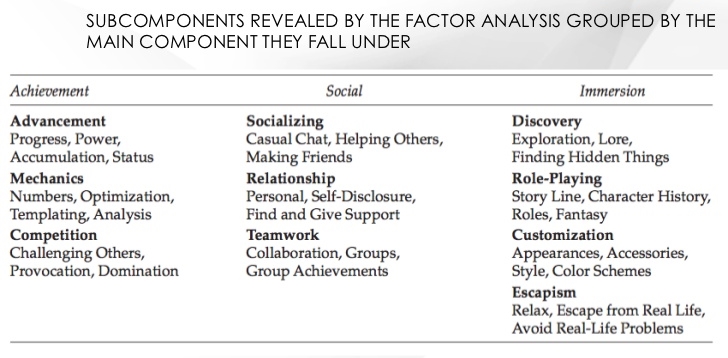Every day millions of people all over the world interact with each other in online environments known as MMORPGs. Asking these players why they play reveals a wide variation of motives. Nick Yee made a study of this subject. Using this I will tonight write down a short and (hopefully) easy to read analysis of the long term benefits that could be gained from a functional ranked PvP scene.
Let us start by asking why people play these types of games. If we can first articulate the motivations then this provides a foundation to explore the methods of creating a satisfying in game environment. For game developers finding out more about player motivation is important since it can emphasise how certain game mechanics may attract or alienate different types of players. Though Bartle’s Player Types is a well-known player taxonomy it would be hard to use on a practical basis unless it was validated with more verifiable data. I will instead use the paper by Nick Yee: Motivations for Play in Online Games. In this study three main components emerged as the principal incentives.
If we now take a closer look at rated gaming in SWTOR we have two types of ranked PvP queues available (even if they are highly dysfunctional due to reasons like imbalance between classes and poor matchmaking resulting in the existing population feeling discouraged to queue). We can queue solo or together with a team. If we analyse these two options with the findings above in mind we can argue that solo queuing for ranked incorporates two of the above main motives for playing: Achievement (Advancement, Mechanics, Competition) and Immersion (Escapism). Team ranked touches upon all three: Achievement (Advancement, Mechanics, Competition), Social (Socializing, Teamwork) and Immersion (Escapism). Of course we could argue that the current form of ranked PvP matches available in this specific game which now consists only of Arenas, meaning 4v4 death matches, limits the experience of immersion considerably.
A functional rating system would assist players by setting them up against an evenly matched team in terms of skill and experience, making ranked PvP an enjoyable environment for any player. However, when the population is too low and/or the players do not have faith in the system in place it breaks down, as we have seen happen in this game. This means two very different groups of players (let’s call them hardcore and casual) have to resolve to fight over the same space: unranked warzones. This results with the more skilled players in the game being left continuously frustrated which is intimidating the less experienced players from participating in PvP, decreasing the PvP population further. From a business point of view this is very bad since all players are left unsatisfied and discouraged to play.
So we’ve come to the conclusion that team ranked touches upon all the three main psychological components which motivates gamers like you and me to start playing and, more importantly, remain active in an MMORPG like SWTOR. It’s proven that player loyalty is highly effected by building social identity through playing cooperatively and working with other players towards a common goal. Securing the functionality of team ranked would increase customer retention and business profit long term. The sad thing is that at this point the question is if it’s too late to make any changes to rectify the mistakes made in the past.





